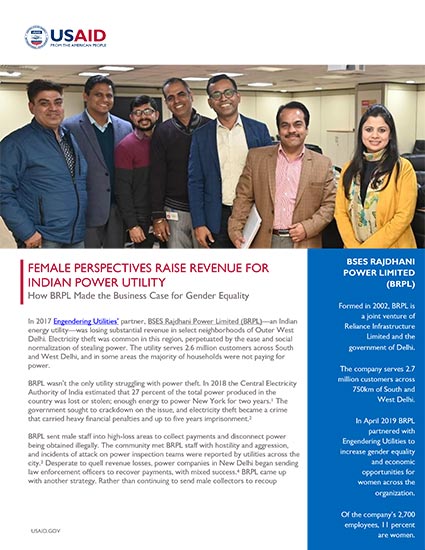- Energy Home
- How We Work
- Programs & Initiatives
- Smart Utilities
- Asia EDGE
- Auction Design Support to Colombia
- Energy Auctions for Kazakhstan’s Green Economy
- Energy Efficiency for Development
- Engendering Utilities
- About
- Business Case
- Approach
- Partners
- OSHEE, Albania
- SONABEL, Burkina Faso
- EDESUR, Dominican Republic
- DELSUR, El Salvador
- EEU, Ethiopia
- Energo-Pro, Georgia
- GRIDCo, Ghana
- BRPL, India
- TPDDL, India
- EDCO, Jordan
- IDECO, Jordan
- Miyahuna, Jordan
- KenGen, Kenya
- Kenya Power
- KOSTT, Kosovo
- LEC, Lesotho
- LEC, Liberia
- EGENCO, Malawi
- EDM, Mozambique
- EKEDC, Nigeria
- IBEDC, Nigeria
- ISWSC, Nigeria
- EVN, North Macedonia
- LASURECO, Philippines
- ZCWD, Philippines
- REG, Rwanda
- OFOR, Senegal
- Senelec, Senegal
- EVN, Vietnam
- Resources
- Stories
- Institutional Framework for Auctions in Mexico
- Powering Agriculture
- The USAID-NREL Partnership
- Scaling Up Renewable Energy
- EmPOWERing Women and Girls
- Competitive Energy Procurement
- Toolkits
- Monitoring & Evaluation
- Resources
- Stories
Speeches Shim
Partner utility BSES Rajdhani Power Limited in India deploys female field staff to improve community relations, reduce electricity theft and illegal connections, and increase revenue.
In 2017 Engendering Utilities’ partner, BSES Rajdhani Power Limited (BRPL)—an Indian energy utility—was losing substantial revenue in select neighborhoods of Outer West Delhi. Electricity theft was common in this region, perpetuated by the ease and social normalization of stealing power. To quell revenue losses, power companies across the city began sending law enforcement officers to recover payments, with mixed success. BRPL came up with another strategy: they sent women to be agents of change.
BRPL leadership asked Shivani Kumar, the utility’s General Manager of Customer Care, to help design a strategy to approach and build relationships with high-loss communities. Kumar assembled a team of women to work in communities with a unique mandate and approach. The women would not wear utility uniforms, demand bill payment, or threaten to disconnect power. Female staff would approach women in the community with one goal: building trust.
The women visited the same neighborhood every day for one month, becoming familiar faces in the community. Over time, BRPL female staff built relationships with women, children, and elderly members of the community. They formed relationships with the male patriarch of the family- the grandfather of the household-knowing the influence he could exert on the family’s decision-making.
Over the weeks Kumar spent in the community she earned community trust. Families invited her in for tea; community-members knew her by name. Kumar reached out to community educators, as principals and teachers hold significant influence with children. She initiated school programs, teaching children that paying for electricity is a social responsibility. Kumar knew that children would return to their homes and reinforce these messages with their families. These multi-tiered, overlapping, and persistent outreach activities were key drivers of behavior change in high-loss communities.
The initiative produced impressive results. The women increased revenue, strengthened customer relations, changed male perspectives on the roles and capacity of female staff, built the confidence of female employees to pursue new roles, and improved the company’s business outcomes.


Comment
Make a general inquiry or suggest an improvement.